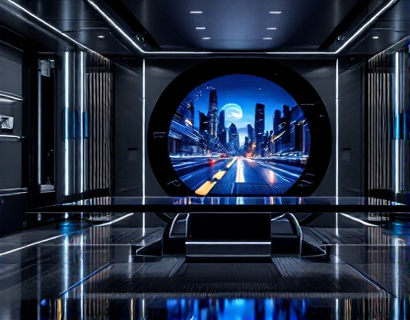Revolutionizing E-Commerce: Advanced Services and Innovative Solutions for Modern Online Shopping Success
The landscape of e-commerce has undergone a profound transformation in recent years, driven by technological advancements, changing consumer behaviors, and the relentless pursuit of innovation. This evolution has given rise to a new generation of online shopping platforms that prioritize convenience, efficiency, and customer satisfaction. These platforms are not just stores; they are comprehensive ecosystems designed to revolutionize the way we shop online. This article delves into the advanced services and innovative solutions that are reshaping the future of e-commerce, making online shopping more accessible, efficient, and delightful.
The core of this revolution lies in the integration of cutting-edge technologies and customer-centric design principles. Modern e-commerce platforms leverage artificial intelligence, machine learning, and big data analytics to create personalized shopping experiences. These technologies enable the platform to understand individual preferences, predict trends, and offer tailored recommendations, thereby enhancing user engagement and satisfaction. By analyzing vast amounts of data, these platforms can optimize inventory management, streamline supply chains, and reduce operational costs, ensuring that the shopping experience is not only seamless but also cost-effective.
One of the key advancements in e-commerce is the implementation of advanced search and recommendation systems. These systems use natural language processing and machine learning algorithms to provide accurate and relevant search results. Users can find what they are looking for quickly and easily, without the frustration of sifting through irrelevant items. Recommendation engines go a step further by suggesting products based on past purchases, browsing history, and even social media activity. This level of personalization not only improves the shopping experience but also increases the likelihood of conversions and repeat visits.
Another significant innovation is the adoption of augmented reality (AR) and virtual reality (VR) technologies. These immersive tools allow customers to visualize products in their own environment before making a purchase. For instance, a furniture retailer can offer an AR feature that lets users see how a sofa would look in their living room. This not only reduces the uncertainty and risk associated with online shopping but also enhances the overall customer experience. By providing a more interactive and engaging shopping journey, these technologies help build trust and confidence in the brand.
Security and trust are paramount in e-commerce, and modern platforms are taking significant steps to address these concerns. Advanced encryption methods, two-factor authentication, and real-time fraud detection systems are now standard features. These measures ensure that customer data is protected and transactions are secure. Additionally, transparent privacy policies and clear communication about data usage help build trust with consumers. By prioritizing security, these platforms not only comply with regulatory requirements but also foster a sense of safety and reliability.
The rise of mobile commerce has been another driving force in the evolution of e-commerce. With the majority of internet access now coming from mobile devices, platforms are optimizing their user interfaces and functionalities for a seamless mobile experience. Responsive design, fast loading times, and intuitive navigation are essential to keep users engaged on their smartphones and tablets. Mobile apps offer additional benefits such as push notifications, location-based services, and streamlined checkout processes, making shopping on-the-go more convenient than ever.
Sustainability is becoming an increasingly important factor in consumer decision-making, and e-commerce platforms are responding by incorporating eco-friendly practices and products. This includes offering sustainable and ethically sourced goods, reducing packaging waste, and implementing carbon-neutral shipping options. By highlighting these efforts, platforms can appeal to the growing number of environmentally conscious consumers and contribute to a more sustainable future. This not only enhances the brand's reputation but also aligns with the values of modern shoppers.
Logistics and delivery services have also seen significant improvements, thanks to advancements in technology and logistics management. Real-time tracking, predictive delivery times, and flexible delivery options are now commonplace. Some platforms are even exploring the use of drones and autonomous vehicles for last-mile delivery, which could further revolutionize the way products are delivered. These innovations not only improve customer satisfaction but also reduce operational costs and environmental impact.
Customer support is another critical area where modern e-commerce platforms are setting new standards. AI-powered chatbots and virtual assistants provide 24/7 support, handling a wide range of queries and issues efficiently. These tools can quickly resolve common problems, freeing up human agents to focus on more complex tasks. Additionally, comprehensive FAQ sections, live chat options, and detailed product information help customers make informed decisions and reduce the need for support requests.
The integration of social commerce is another trend transforming the e-commerce landscape. Platforms are leveraging social media platforms to create seamless shopping experiences. Users can discover products, make purchases, and interact with brands directly within their social media feeds. This not only increases brand visibility but also provides a more natural and engaging way to shop. Social proof, such as user reviews and ratings, plays a crucial role in building trust and influencing purchasing decisions.
Personalization extends beyond product recommendations to encompass the entire shopping journey. From customized landing pages to personalized email campaigns, every touchpoint is designed to resonate with the individual customer. Data-driven insights allow platforms to create targeted marketing strategies that speak directly to the needs and preferences of their audience. This level of personalization not only enhances the shopping experience but also drives higher conversion rates and customer loyalty.
The future of e-commerce is also being shaped by the Internet of Things (IoT) and smart home technologies. As more devices become interconnected, the potential for integrated shopping experiences grows. For example, a smart home system could automatically reorder consumable items based on usage patterns, or a smart refrigerator could suggest recipes and related products. These innovations blur the lines between shopping and daily life, making the process more intuitive and convenient.
In conclusion, the advancements in e-commerce services and innovative solutions are revolutionizing the way we shop online. By focusing on personalization, security, mobility, sustainability, and customer support, modern platforms are creating a shopping experience that is not only efficient and enjoyable but also aligned with the values and expectations of today's consumers. As technology continues to evolve, the potential for further innovation and transformation in e-commerce is vast, promising an even more exciting future for online shopping.











































